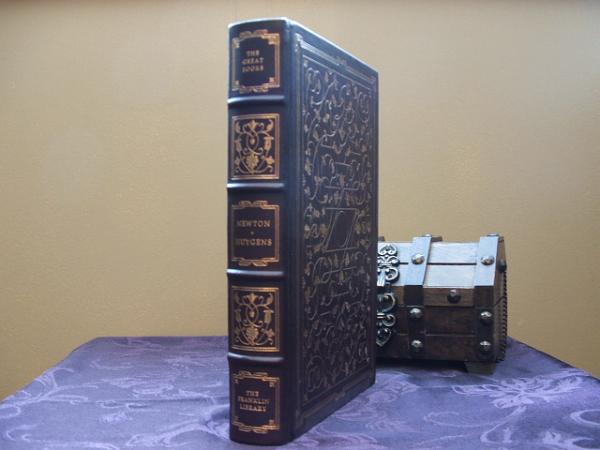Franklin Library Christiaan Huygens books
Works of Christiaan Huygens and Isaac Newton - Great Books of the Western World - 1985
(This page contains affiliate links for which we may be compensated.)
Christiaan Huygens biography
Christiaan Huygens (1629–1695) was a Dutch mathematician, astronomer, physicist, and inventor who made significant contributions to a wide range of scientific fields during the 17th century. He was born on April 14, 1629, in The Hague, Netherlands, and died on July 8, 1695, in The Hague. In the quietude of the Dutch Golden Age, where canals wove through the landscape like ribbons of life, Christiaan Huygens emerged as a polymath of unparalleled brilliance, leaving an indelible mark on the realms of science, mathematics, and philosophy. Born on April 14, 1629, in The Hague, Netherlands, Huygens was the second son of the eminent diplomat and poet Constantijn Huygens. From an early age, young Christiaan displayed a precocious intellect and an insatiable curiosity about the natural world. His father's extensive network introduced him to the luminaries of the era, fostering an environment where intellectual pursuits were nurtured and encouraged. Huygens's education, influenced by a blend of classical studies and modern scientific thinking, laid the groundwork for a future marked by groundbreaking discoveries.
In 1655, Huygens turned his attention to the heavens, unveiling his masterpiece—a groundbreaking work that would forever alter humanity's understanding of the cosmos. With meticulous craftsmanship, he designed and built the first practical pendulum clock, a marvel of precision that not only revolutionized timekeeping but also laid the foundation for advancements in navigation and astronomy.
Huygens's journey into the celestial realm did not end with the pendulum clock. Armed with a keen interest in optics and a deepening appreciation for the cosmos, he turned his gaze skyward. In 1655, he discovered Titan, Saturn's largest moon, using a telescope he had designed and constructed. This triumph in observational astronomy expanded our knowledge of the solar system and solidified Huygens's place among the great astronomers of his time. In 1659, Huygens published Systema Saturnium, a comprehensive work that detailed his observations of Saturn's rings and the discovery of its moon Titan. The book not only cemented his reputation as a skilled observer but also contributed significantly to the growing body of astronomical knowledge.
Huygens's intellectual prowess extended beyond the celestial realms. In mathematics, he made pioneering contributions to probability theory, laying the groundwork for the later development of statistics. His work on the theory of light, presented in his treatise Traité de la Lumière (Treatise on Light), challenged prevailing notions and set the stage for wave optics.
Amidst his scientific endeavors, Huygens navigated the intellectual currents of his time. He engaged in correspondence with fellow luminaries such as Isaac Newton and Robert Boyle, participating in the vibrant scientific discourse that characterized the 17th century. Huygens's ability to synthesize theory with meticulous experimentation marked him as a true Renaissance figure.
As the years unfolded, Huygens continued his scientific pursuits, contributing to the understanding of celestial bodies, wave theory, and the nature of light. On July 8, 1695, this intellectual giant took his final breath, leaving behind a legacy that transcends the boundaries of time. Christiaan Huygens's impact on science, mathematics, and the philosophy of inquiry endures, a testament to the profound influence of a mind that dared to explore the mysteries of the cosmos.
